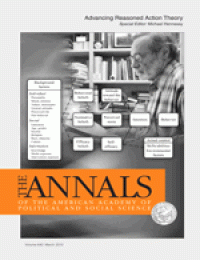
Journal Articles
Perceived Behavioral Control in Reasoned Action Theory : A Dual-Aspect Interpretation
The inclusion of perceptions of control over behavioral performance has importantly advanced the ability of reasoned action theory to explain behavioral intentions and predict behavior. In consequence, the theory has usefulness as a tool for developing behavior change interventions. Despite the theoretical and practical importance of a perceived behavioral control construct, there remains ambiguity regarding the precise meaning and measurement of items. A central issue is that items used to measure perceived behavioral control often load on two factors, one composed of confidence-framed items and the other of control-framed items. According to reasoned action theory, these two factors represent capacity and autonomy aspects of perceived behavioral control. In this article I review the usefulness of the current dual-aspect conceptualization of perceived behavioral control, present illustrative perceived capacity and autonomy data, and discuss new areas of inquiry that can further advance the conceptualization of perceived behavioral control.
Availability
No copy data
Detail Information
- Series Title
-
The ANNALS of the American Academy of Political and Social Science
- Call Number
-
-
- Publisher
- Thousand Oak : sage publisher., 2012
- Collation
-
-
- Language
-
English
- ISBN/ISSN
-
00027162
- Classification
-
-
- Content Type
-
-
- Media Type
-
-
- Carrier Type
-
-
- Edition
-
Vol. 640 no. 1, March 2012,pp. 101-117
- Subject(s)
- Specific Detail Info
-
-
- Statement of Responsibility
-
-
Other version/related
No other version available
File Attachment
Comments
You must be logged in to post a comment
 Computer Science, Information & General Works
Computer Science, Information & General Works  Philosophy & Psychology
Philosophy & Psychology  Religion
Religion  Social Sciences
Social Sciences  Language
Language  Pure Science
Pure Science  Applied Sciences
Applied Sciences  Art & Recreation
Art & Recreation  Literature
Literature  History & Geography
History & Geography